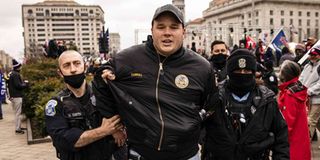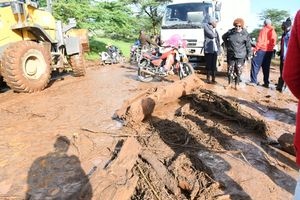US Congress siege questions fallibility of democracy

US Park Police officers arrest a man on gun charges after they spotted him carrying a concealed firearm during a pro-Trump rally at Freedom Plaza on January in Washington, DC.
What you need to know:
- The US has supported truly barbaric regimes in Africa and elsewhere before.
Historians, political analysts and pundits of various persuasions should not be shocked by what happened in Washington DC last Wednesday, bizarre as it was.
The historic incident merely questions the dominant assumption among liberal political theorists that with well-supported institutions, democracy is the one system that is guaranteed to last. Well, maybe, except that in America, it is still a work in progress.
The nation that has for more than two centuries been celebrated as the citadel of democratic ideals, the exemplifier of all that is noble and admirable in the system of governance that places the people’s will at the core of its institutions suffered a seismic jolt when frenzied supporters of President Donald Trump temporarily took over the US Congress in what has been described as a “failed insurrection” or coup.
Remarkably, or perhaps predictably, the breach of Congress that occurred as representatives voted to certify President-elect Joe Biden’s victory was triggered by the President himself with remarks at a rally across town calling on his MAGA supporters not to accept the exercise that he falsely claimed legitimised fraudulent elections.
Once the mob had executed its extraordinary action, all the President could say was: “We have to have peace. So go home. We love you – you are very special”.
Promised land
He was celebrating the coming of age of Trumpism, the rabidly right-wing racist conservative movement that finds confidence in its capacity to upset any notion of a political arrangement that accommodates all voices, shapes and opinions, and which, in President Barack Obama’s words, makes America “the promised land”.
Outside America, underlying the shock, guffaws and derision that the insurrection triggered in diverse places, is the realisation that the legitimacy that its democratic credentials allowed it to use to boss the world to behave in a certain way has been seriously eroded.
While China is mocking the US system as weak and unable to control a “small” unruly mob without people dying (comparing the Wednesday incident with the way China handled the massive pro-democracy protests in Hong Kong early last year), it is in Africa that interesting questions are being raised and pointed criticisms made.
Moral authority
A tweet attributed to Zimbabwe President Emmerson Mnangagwa chided the US as having lost all moral authority to continue imposing sanctions that the US has maintained against the southern Africa country on account of its human rights and democratic record.
This is obviously a futile comeback triggered by the excitement of the moment, because even dictatorial systems apply self-interest considerations to determine who to support or not.
The US has supported truly barbaric regimes in Africa and elsewhere before.
More subtle is the way the Wednesday incident may reframe debate about the different shades of dictatorships and democracy playing out in African countries. I recall conversations after the 2017 presidential elections in Rwanda that saw President Paul Kagame win with a 98 per cent margin.
Criticism that the RPF government had forced the Rwandese to vote almost as one was countered by questions as to why the critics felt that it was not democratic if Rwandese voted the way they wanted.
Particularly so since the majority were happy with the performance of the government.
Put differently, is the US version of democracy the sole measure of what dispensation is acceptable in all socio-political environments?
Blanket criticism
If Tanzania’s President John Pombe Magufuli, aka the Bulldozer, were to ease back on the excesses of violence and unhappy and largely unnecessary restrictions on media and the Opposition politicians, could the blanket criticism against his CCM government as undemocratic be justifiable if it is delivering services to the people and making the corrupt and the profligate in his government uncomfortable and accountable?
And should we in Kenya perhaps take a step back from our obsession with trying to tinker with variants of democracy that we now know are based on institutions once thought impregnable but are clearly not and try to build something that works for us?
Are we all not trying to speak at the same time and not allowing opportunity to listen?
Ultimately, the siege of the US Congress and rise of Trumpism in America fractures democracy’s façade of implacability and throws open the debate whether any country can claim a more preferable ideological philosophy over any other.
[email protected], @tmshindi





